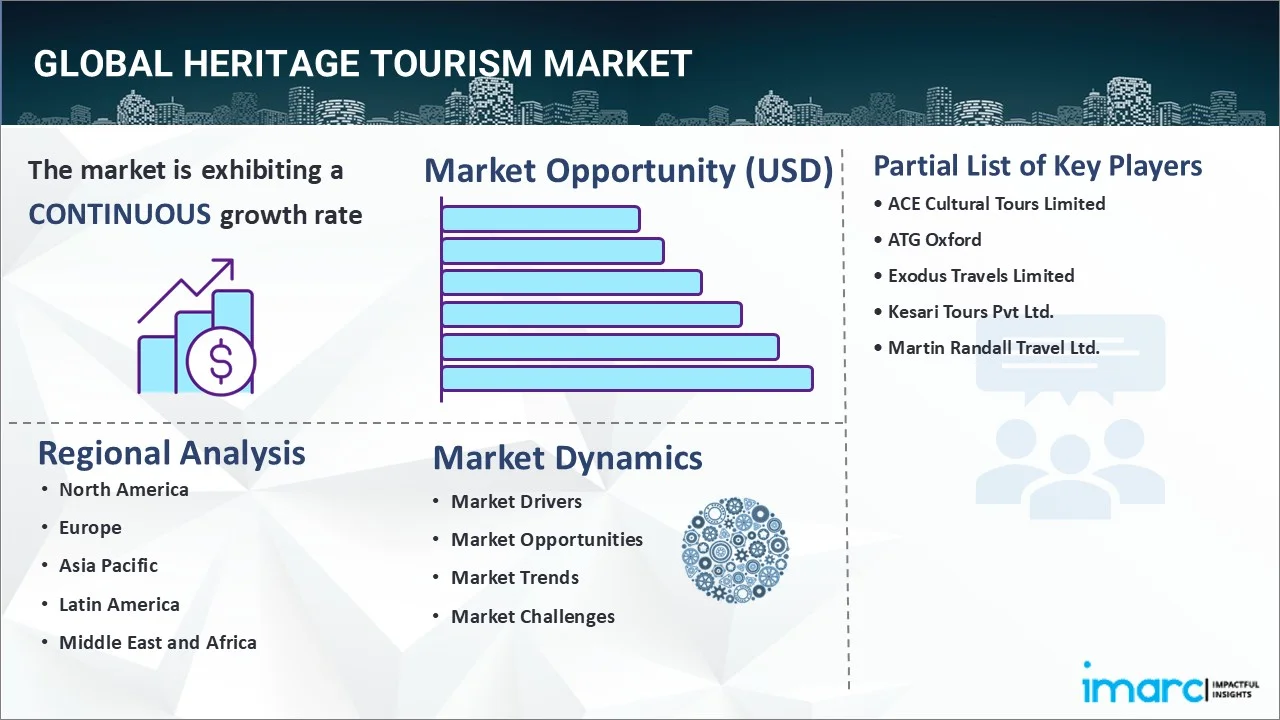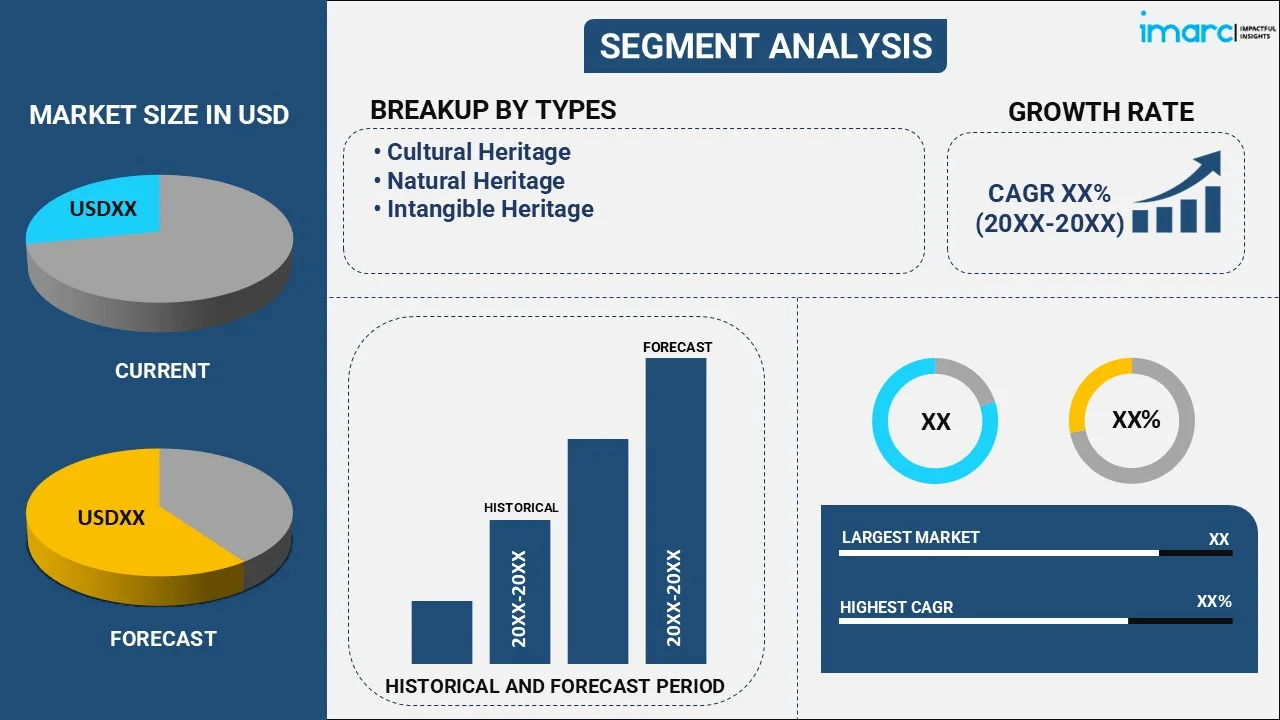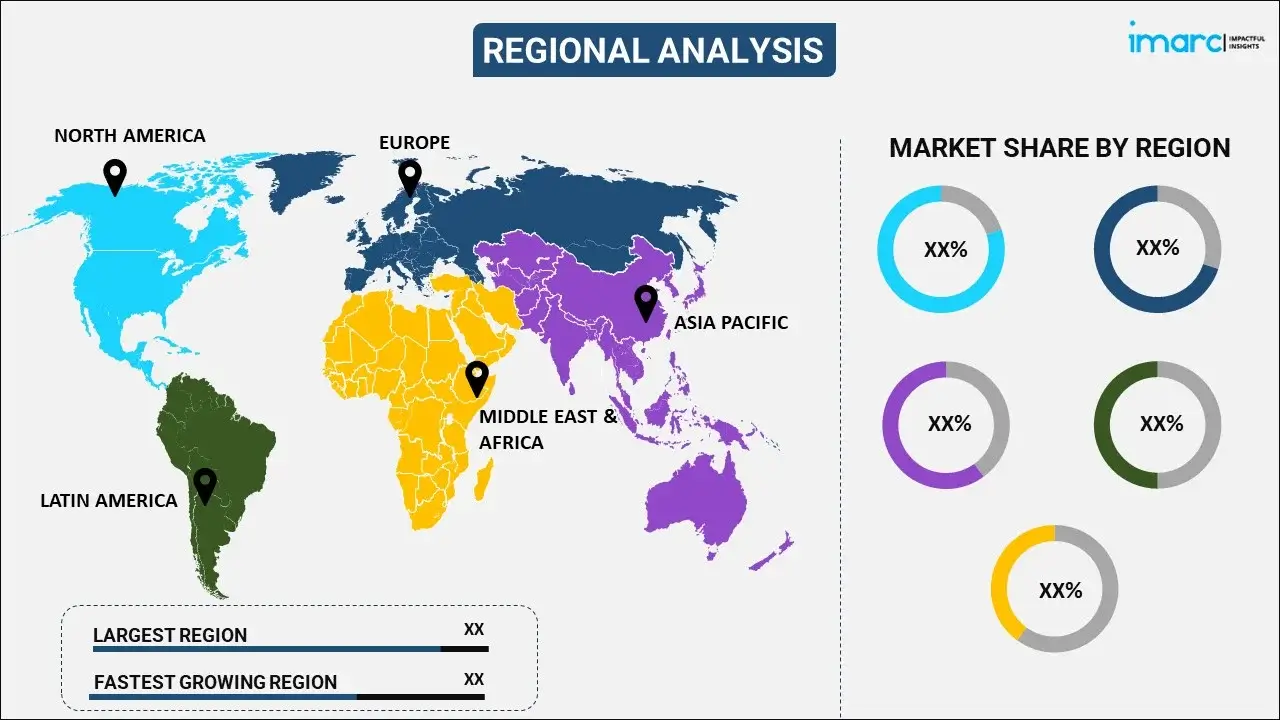
Heritage Tourism Market Report by Type (Cultural Heritage, Natural Heritage, Intangible Heritage), Booking Channel (Online, Offline), End User (30 and Under, 31 to 50, 51 to 70, 71 and Above), and Region 2025-2033
Market Overview:
The global heritage tourism market size reached USD 608.8 Billion in 2024. Looking forward, IMARC Group expects the market to reach USD 843.5 Billion by 2033, exhibiting a growth rate (CAGR) of 3.51% during 2025-2033. The international partnerships and heritage exchange programs, the increasing educational programs and workshops on heritage topics, the positive impact of heritage tourism on rural and remote economies, and the growing number of film and entertainment industries showcasing heritage locations are some of the factors propelling the market.
|
Report Attribute
|
Key Statistics
|
|---|---|
|
Base Year
|
2024 |
|
Forecast Years
|
2025-2033
|
|
Historical Years
|
2019-2024
|
| Market Size in 2024 | USD 608.8 Billion |
| Market Forecast in 2033 | USD 843.5 Billion |
| Market Growth Rate 2025-2033 | 3.51% |
Heritage tourism refers to a form of travel where visitors explore and experience a particular destination's historical, cultural, and natural assets. It involves visiting heritage sites, museums, monuments, historical buildings, traditional festivals, and other places of significance to learn about the past and immerse in local traditions. It has gained popularity as individuals seek meaningful and authentic travel experiences. It promotes cultural exchange and contributes to the preservation and conservation of historical sites and traditions. Tourists gain a deeper understanding of a region's identity, history, and customs, fostering respect and appreciation for diverse cultures. This form of tourism has significant economic benefits, stimulating local economies through increased visitor spending on accommodations, food, souvenirs, and related services. It also creates employment opportunities and encourages the development of tourism infrastructure.

The global market is majorly driven by the increasing interest in cultural exploration. In line with this, the preservation and restoration efforts of heritage sites are significantly contributing to the market. Furthermore, the rising governments support and promotion of cultural tourism and the growing popularity of UNESCO World Heritage Sites are positively influencing the market. Apart from this, the escalating disposable incomes and leisure travel and the development of heritage-themed travel packages are catalyzing the market. Moreover, the increasing marketing and promotion of heritage destinations is offering numerous opportunities for the market. Besides, the integration of technology in heritage tourism experiences is propelling the market. Nostalgia and interest in the past are creating a positive outlook for the market. Additionally, the rising desire for authentic and immersive travel experiences is providing a boost to the market.
Heritage Tourism Market Trends/Drivers:
The emergence of specialized heritage tour operators
The emergence of specialized heritage tour operators is fueling market expansion. These tour operators focus on designing curated travel experiences that cater to travelers seeking in-depth exploration of cultural heritage and historical sites. By offering expertly crafted itineraries and unique insights, these operators attract a niche audience of history enthusiasts, cultural researchers, and curious travelers. Specialized heritage tour operators have an in-depth understanding of local customs, traditions, and historical significance, providing travelers with authentic and immersive experiences. They collaborate with heritage sites, local communities, and experts, enhancing the overall quality of the tour and ensuring sustainable tourism practices. With a growing interest in cultural exploration and authentic travel experiences, travelers are increasingly drawn to these specialized tours beyond typical tourist attractions. This demand fuels the growth of the market as more operators enter the industry, creating diverse offerings to meet the varied interests of travelers keen on uncovering the world's cultural treasures.
Increasing popularity of historical TV shows and movies
The increasing popularity of historical TV shows and movies is bolstering the market. These entertainment mediums offer a captivating glimpse into the past, sparking curiosity and interest in historical periods and iconic locations depicted in the shows and films. As viewers become engrossed in the storytelling and visual representation of historical events, they desire to visit the sites featured, resulting in a rise in heritage tourism. Fans of historical TV shows and movies often seek to immerse themselves in authentic settings and experience the culture and heritage firsthand. They are drawn to destinations that hold historical significance, mirroring the ones portrayed in the media. This increased interest encourages tourism boards, travel agencies, and heritage tour operators to capitalize on the trend by developing thematic travel packages and guided tours catering to these interests. The influence of historical TV shows and movies on travel decisions, combined with the desire for authentic and immersive experiences, continues to propel the market, positively impacting local economies and cultural preservation efforts.
The rising influence of social media and travel influencers
The rising influence of social media and travel influencers is fostering the market. With millions of followers and engaged audiences, travel influencers can showcase their experiences at heritage destinations, creating a compelling narrative that resonates with their followers. Their captivating visuals and authentic storytelling inspire travelers to explore cultural heritage and historical sites, driving the market. Through Instagram, YouTube, blogs, and other social platforms, travel influencers showcase the beauty, charm, and historical significance of various destinations, piquing the curiosity of their followers. The aspirational content they produce fuels the desire for unique and immersive travel experiences, leading travelers to seek out heritage sites and cultural landmarks. Additionally, social media platforms serve as valuable tools for travel research, as users can easily discover lesser-known heritage locations and engage with fellow travelers who have visited these places. This increased accessibility to information and peer recommendations further drives interest in heritage tourism, contributing to the market's growth. As social media and influencer marketing evolve, their impact on heritage tourism is expected to grow, influencing travel decisions and shaping how individuals experience and appreciate cultural heritage.
Heritage Tourism Industry Segmentation:
IMARC Group provides an analysis of the key trends in each segment of the global heritage tourism market report, along with forecasts at the global, regional and country levels from 2025-2033. Our report has categorized the market based on type, booking channel, and end user.
Breakup by Type:

- Cultural Heritage
- Natural Heritage
- Intangible Heritage
Cultural Heritage dominates the market
The report has provided a detailed breakup and analysis of the market based on the type. This includes cultural heritage, natural heritage, and intangible heritage. According to the report, cultural heritage represented the largest segment.
Cultural heritage, which includes historical sites, monuments, traditional festivals, and indigenous arts, attracts travelers interested in exploring different cultures' unique identities and customs. Tourists seek to immerse themselves in a destination's rich history and customs, fostering cross-cultural understanding and appreciation. The increasing interest in cultural exploration contributes to market growth as travelers seek authentic and sustainable experiences encompassing cultural heritage.
On the other hand, natural heritage, comprising national parks, wildlife sanctuaries, and scenic landscapes, entices travelers seeking to experience the beauty and serenity of nature. The allure of pristine environments and opportunities for eco-tourism draw nature enthusiasts and adventure seekers to these destinations.
Breakup by Booking Channel:
- Online
- Offline
Online dominates the market
The report has provided a detailed breakup and analysis of the market based on the booking channel. This includes online and offline. According to the report, online represented the largest segment.
Online booking platforms have revolutionized the travel industry, making it convenient for travelers to research, plan, and book their heritage trips. The ease of browsing various heritage destinations, comparing prices, and reading reviews empower travelers to make informed decisions, boosting the demand for heritage tours and experiences.
Furthermore, online platforms enable heritage tourism companies to reach a global audience, expanding their market reach and customer base. Social media and online marketing efforts also raise awareness about cultural and historical sites, generating interest among travelers.
Moreover, offline booking channels have significance, particularly for older or less tech-savvy travelers who prefer face-to-face interactions with travel agents. Traditional travel agencies and brochures continue to attract certain segments of the market, contributing to heritage tourism growth.
Breakup by End User:
- 30 and Under
- 31 to 50
- 51 to 70
- 71 and Above
51 to 70 dominates the market
The report has provided a detailed breakup and analysis of the market based on the end user. This includes 30 and under, 31 to 50, 51 to 70, and 71 and above. According to the report, 51 to 70 represented the largest segment.
Travelers aged 31 to 50, belonging to Generation X and early millennials, are a key segment driving the heritage tourism market. With more disposable income and a desire for personal growth and enrichment, this age group seeks to explore historical and cultural destinations. They appreciate heritage sites' educational value and nostalgic appeal, making heritage tourism an attractive option. Their preference for diverse and unique experiences fuels the demand for curated heritage tours and packages, propelling market growth as travel companies cater to their interests and preferences.
Furthermore, travelers aged 30 and under, often referred to as millennials and Gen Z, have a strong inclination towards authentic and experiential travel. They seek meaningful and immersive experiences that allow them to connect with the local culture and heritage, making heritage tourism a popular choice for this demographic. Their affinity for social media and online platforms also amplifies the influence of travel influencers, who inspire and guide their travel choices, further contributing to the market growth.
Breakup by Region:

- North America
- United States
- Canada
- Europe
- Germany
- France
- United Kingdom
- Italy
- Spain
- Others
- Asia Pacific
- China
- Japan
- India
- South Korea
- Australia
- Indonesia
- Others
- Latin America
- Brazil
- Mexico
- Others
- Middle East and Africa
Asia Pacific exhibits a clear dominance, accounting for the largest market share
The report has also provided a comprehensive analysis of all the major regional markets, which include North America (the United States and Canada); Europe (Germany, France, the United Kingdom, Italy, Spain, and others); Asia Pacific (China, Japan, India, South Korea, Australia, Indonesia, and others); Latin America (Brazil, Mexico, and others); and the Middle East and Africa. According to the report, Asia Pacific accounted for the largest market share.
Several destinations across the Asia Pacific offer diverse cultural experiences, from ancient civilizations to the colonial history of multiple countries. The region's promotion of heritage tourism, advanced travel infrastructure, and online booking channels contribute to its market growth. The market further benefits from the rising popularity of cultural exploration as travelers seek authentic and immersive experiences that connect them to the past.
Furthermore, with its centuries-old history and well-preserved architecture, Europe remains a top destination for heritage travelers. Countries like Italy, France, Spain, and the United Kingdom offer iconic heritage sites, art masterpieces, and cultural festivals. The well-established tourism industry and European transportation networks further catalyze the market. As Europe continues to showcase their diverse heritage and engage with modern travelers, they are set to sustain their leadership in the market.
Competitive Landscape:
Top companies are actively strengthening market growth through several strategic approaches. They are focusing on curating unique and immersive travel experiences that cater to the specific interests of history enthusiasts and cultural explorers. By offering well-researched and expertly guided tours, they attract a niche audience seeking in-depth knowledge and meaningful interactions with heritage sites. These companies invest in sustainable tourism practices, collaborating with local communities and heritage site managers to ensure responsible and respectful tourism. By promoting conservation efforts and minimizing the environmental impact, they appeal to socially conscious travelers who prioritize ethical travel. Furthermore, top companies leverage technology and digital platforms to reach a broader audience, engaging with potential travelers through social media, online content, and virtual experiences. Additionally, they establish strategic partnerships with heritage site authorities, travel agencies, and cultural organizations to enhance their offerings and expand their reach.
The report has provided a comprehensive analysis of the competitive landscape in the heritage tourism market. Detailed profiles of all major companies have also been provided.
- ACE Cultural Tours Limited
- ATG Oxford
- Exodus Travels Limited
- Kesari Tours Pvt Ltd.
- Martin Randall Travel Ltd.
Heritage Tourism Market Report Scope:
| Report Features | Details |
|---|---|
| Base Year of the Analysis | 2024 |
| Historical Period | 2019-2024 |
| Forecast Period | 2025-2033 |
| Units | Billion USD |
| Scope of the Report | Exploration of Historical and Forecast Trends, Industry Catalysts and Challenges, Segment-Wise Historical and Predictive Market Assessment:
|
| Types Covered | Cultural Heritage, Natural Heritage, Intangible Heritage |
| Booking Channels Covered | Online, Offline |
| End Users Covered | 30 and Under, 31 to 50, 51 to 70, 71 and Above |
| Regions Covered | Asia Pacific, Europe, North America, Latin America, Middle East and Africa |
| Countries Covered | United States, Canada, Germany, France, United Kingdom, Italy, Spain, China, Japan, India, South Korea, Australia, Indonesia, Brazil, Mexico |
| Companies Covered | ACE Cultural Tours Limited, ATG Oxford, Exodus Travels Limited, Kesari Tours Pvt Ltd., Martin Randall Travel Ltd., etc. |
| Customization Scope | 10% Free Customization |
| Post-Sale Analyst Support | 10-12 Weeks |
| Delivery Format | PDF and Excel through Email (We can also provide the editable version of the report in PPT/Word format on special request) |
Key Questions Answered in This Report:
- How has the global heritage tourism market performed so far, and how will it perform in the coming years?
- What are the drivers, restraints, and opportunities in the global heritage tourism market?
- What is the impact of each driver, restraint, and opportunity on the global heritage tourism market?
- What are the key regional markets?
- Which countries represent the most attractive heritage tourism market?
- What is the breakup of the market based on the type?
- Which is the most attractive type in the global heritage tourism market?
- What is the breakup of the market based on the booking channel?
- Which is the most attractive booking channel in the global heritage tourism market?
- What is the breakup of the market based on the end user?
- Which is the most attractive end user in the global heritage tourism market?
- What is the breakup of the market based on gender?
- Which is the most attractive gender in the global heritage tourism market?
- What is the competitive structure of the global heritage tourism market?
- Who are the key players/companies in the global heritage tourism market?
Key Benefits for Stakeholders:
- IMARC’s report offers a comprehensive quantitative analysis of various market segments, historical and current market trends, market forecasts, and dynamics of the heritage tourism market from 2019-2033.
- The research study provides the latest information on the market drivers, challenges, and opportunities in the global heritage tourism market.
- The study maps the leading, as well as the fastest-growing, regional markets. It further enables stakeholders to identify the key country-level markets within each region.
- Porter's five forces analysis assists stakeholders in assessing the impact of new entrants, competitive rivalry, supplier power, buyer power, and the threat of substitution. It helps stakeholders to analyze the level of competition within the heritage tourism industry and its attractiveness.
- Competitive landscape allows stakeholders to understand their competitive environment and provides an insight into the current positions of key players in the market.
Need more help?
- Speak to our experienced analysts for insights on the current market scenarios.
- Include additional segments and countries to customize the report as per your requirement.
- Gain an unparalleled competitive advantage in your domain by understanding how to utilize the report and positively impacting your operations and revenue.
- For further assistance, please connect with our analysts.
 Request Customization
Request Customization
 Speak to an Analyst
Speak to an Analyst
 Request Brochure
Request Brochure
 Inquire Before Buying
Inquire Before Buying




.webp)




.webp)












